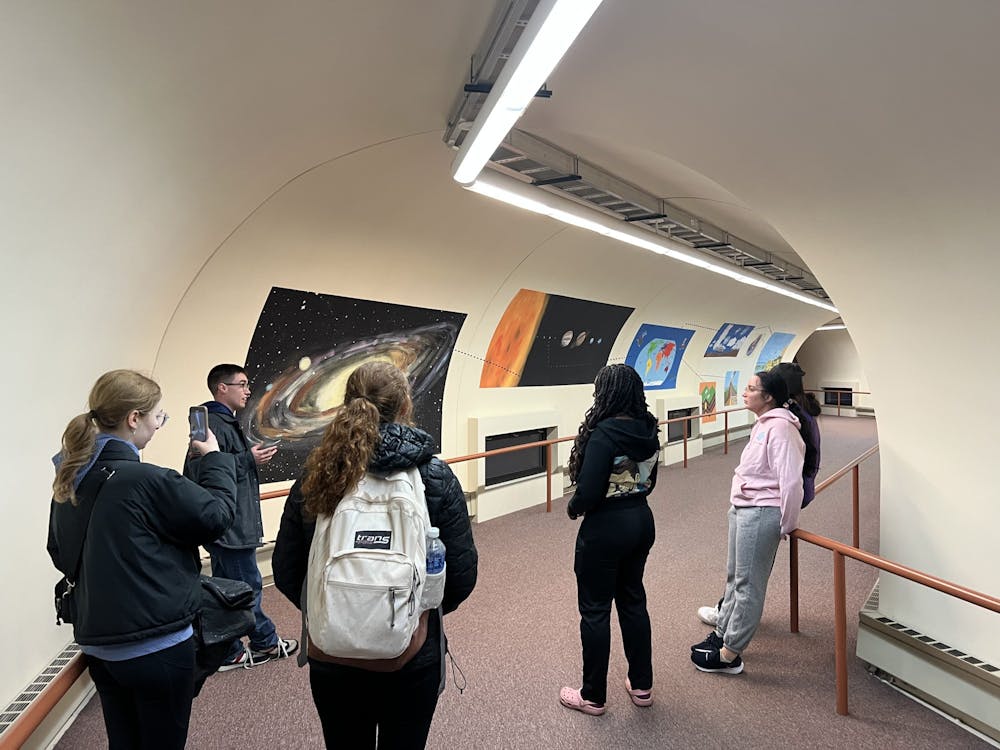'Our goal is to institutionalize sustainability': Central Sustainability hosts walking tour

CMU senior and Lead Sustainability Coordinator at Central Sustainability, Eric Urbaniak explains how the art on the walls of the Dow and Brooks tunnel is an example of social sustainability.
On a cold and rainy April 19, Central Michigan University students gathered outside the Bovee University Center for Central Sustainability’s Earth Week Walking Tour.
For a little over an hour, CMU senior and Lead Sustainability Coordinator Eric Urbaniak led a small group of students on a tour of campus to learn about sustainability. From greenspaces and solar panels to artwork around campus, all were used as examples of environmental conservancy.
“We’re looking at especially environmental, social and cultural sustainability,” Urbaniak said. “And always thinking about economic sustainability as well.”
Throughout this tour, which was cut short because of the rainfall, the common theme consisted of three pillars of sustainability: environmental, economic and social.
- Environmental sustainability can be looked at as an organization's impact on things such as water and air health or clean, efficient energy.
- Economic sustainability focuses more on job and wealth creation, or product development and investment in your environment.
- Social sustainability is centered around community building and education.
With stops at locations such as CMU’s Graduate Housing Complex, the Jack Saunder Marching Band Field and the Dow and Brooks catwalk, each form of sustainability was on display.
According to cmich.edu, CMU’S Graduate Housing Complex is the first multi-family building in the Midwest to be certified platinum by Leadership in Energy and Environmental Design (LEED). As stated on usgbc.org, LEED is the world's most widely used green building rating system in the world. This can be seen as an example of economic sustainability.
Jack Saunders Marching Band Field can be used as an example of environmental sustainability. According to Central Sustainability’s virtual interactive sustainability walking tour, CMU has a zero-waste dining program, where all food waste is composted at a local business, then brought back by CMU as compost to fertilize places such as this field.
Connecting Dow Science Complex and Brooks Hall, the Dow and Brooks catwalk was used as an illustration of social sustainability on the tour. With student artwork lining the walls of the link between, this created a space for artwork and personal expression that can play a part in community building.
With only six workers, Central Sustainability is a student-run and led office on CMU’s campus. According to it’s website, Central Sustainability has received many awards for the efforts around campus since its creation in May of 2020. This includes organizations such as the United States Environmental Protection Agency (EPA) and the Association for the Advancement of Sustainability in Higher Education (AASHE).
“Our goal is to institutionalize sustainability,” said Tiffany Jurge, CMU sophomore and sustainability coordinator for Central Sustainability. “So, while we are doing these projects and programming, we still ensure basic things like those [AASHE] reports, assessing the university's overall level of sustainability, things like that.”
Other events hosted by Central Sustainability include waste audits, soup and substance events, community cleanups and more.
“We’re a platform for any sustainability projects,” Jurge said. “We take on that initiative ourselves by doing our own projects ... but we also act as a space for other people, community members to come and explain to us these ideas that they think should be implemented, but they don’t have the manpower or don’t know where to start.”
More information about Central Sustainability and other sustainability efforts on campus can be found on cmich.edu or on their website.






